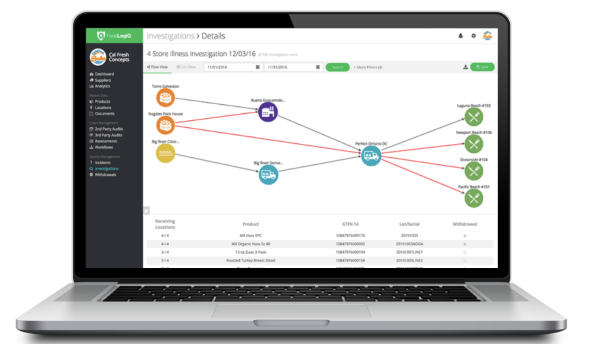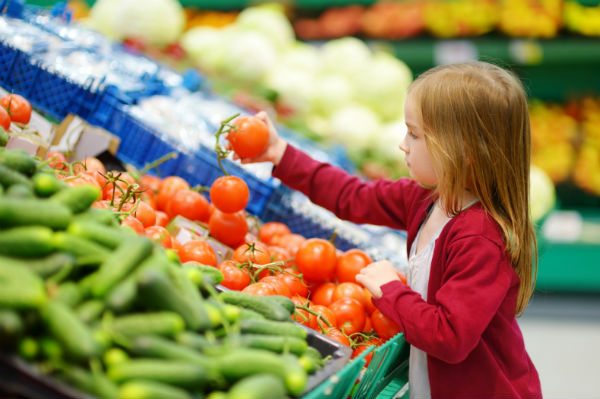
Durham's FoodLogiQ Promotes Data Sharing to Protect Food Safety

About 48 million people in the United States get sick each year from the food they eat. That’s according to the U.S. Centers for Disease Control and Prevention.
To put that number in perspective, it’s nearly 25 times higher than currently confirmed cases of COVID-19 in this country.
No doubt, food safety is a real concern. And it’s attracting increased public scrutiny, fueled by periodic and often attention-grabbing reports of foodborne illness. Included among them:
- A highly publicized string of E. coli outbreaks at Chipotle Mexican Grill restaurants a little over two years ago that sickened more than 1,000 people.
- The contamination of romaine lettuce from farms in Salinas, California during the fall of 2019 that affected consumers in 27 states.
- And just this week, the recall of 43,000 pounds of ground beef sold at Walmart and other retailers with possible E. coli contamination.
As the food chain has become more complex and global in scope – and as the government has ramped up regulatory oversight – producers, processors and distributors have scrambled to put better systems in place to track the food supply from farm to fork.
One of the problems, though, is that food suppliers use different traceability systems – with different technologies – that don’t always speak the same language. So they aren’t able to connect and communicate with each another. That can create data gaps and delays in addressing food safety problems when they occur.
Change on the horizon: FoodLogiQ, partners connect the data
Improvement appears to be on the horizon. Durham-based FoodLogiQ, one of the foremost providers of food safety and traceability solutions, is collaborating with three other food industry technology leaders. The goal is to broadly connect data across different supply chain partners and tracking systems.

-- FoodLogiQ photos
Data sharing on a wide scale is important. It helps keep the food supply safer by identifying and tracking products so food companies can respond faster, with better results, when safety issues arise.
That tracing information provides a record of where food is headed – and where it’s been – on its journey from production through processing and distribution to restaurants, grocery stores and, ultimately, consumers.
Working with FoodLogiQ on the project are IBM Food Trust, ripe.io and SAP. All of these companies provide traceability solutions and have considerable experience in food production, supply chain operations and data collection and organization.
The four business partners recently completed an initial three-month proof-of-concept study to see if different food traceability systems can send and share information in a standardized way.
GS1 US led the study. Its parent company, GS1, is the global go-to organization for businesses that need to identify, capture and exchange data. The industry partners all used GS1 Standards for product and location identification and EPCIS (Electronic Product Code Information Services) as their data collection model.
The data exchange phase of the proof-of-concept yielded positive results, FoodLogiQ reported. The four companies were able to simulate a seafood supply chain that could share information across their different traceability systems.
“I’m pleased to say that the results from this first phase are very encouraging,” said Todd Dolinsky, chief product officer at FoodLogiQ. “The data exchange among all four technology providers was a success.”
FoodLogiQ CEO Sean O’Leary added, “We have demonstrated that, regardless of the underlying technology being used to house the data ... food companies will be able to connect their systems to achieve the holy grail of whole chain traceability.”
The next step in what is a multi-stage process is for the participants to take a closer look at results, review what they’ve learned, and decide where they can make improvements.
Second phase of study to begin soon
A second phase will begin in the third quarter of this year. The companies and their industry partners – suppliers, distributors, retailers and food service operators – will work together to more comprehensively standardize the data-collection model and to fine-tune the types of tracking information they need to capture.

“While the data exchange portion of the proof-of-concept is complete, there is much more to learn about interoperability,” said Julie McGill, FoodLogiQ’s vice president of Supply Chain Strategy and Insights. “One of the next steps will be to understand what we can do with this shared information that will move our world’s food supply chain forward and make it safer and more transparent for us all.”
FoodLogiQ is a software as service (SaaS) provider of food traceability, food safety and supply chain transparency solutions. The privately owned company, founded in 2006, is headquartered on Meridian Parkway in Durham. It has a team of 72 employees and a variety of consultants.
